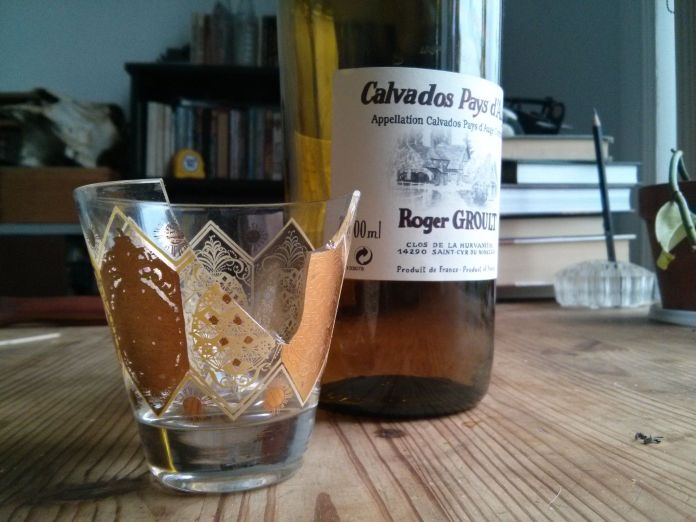~
I am totally infatuated with this calvados. I want to hold a cup of it between fantastically calloused hands as I wake up with the sun. I want to appreciate it in a yellow pavilion between rounds of Russian roulette with a jealous baron. I want to put too much of it away playing dice in the winter, drink it in my underwear while I look out the window waiting for summer to come. I want to and I do and I will. The nights are getting longer, it won’t be long.
Because this drink does something that I love in wine but which I don’t often encounter in spirits; it seems to speak to a life that it had before it became a drink. Maybe not of a place, per se, in the sense of terroir (if it speaks of a place I think it speaks of many places), but of a materiality prior to that artful abstraction that is potable alcohol (apologies for the alliteration). An earthiness, but also a worldliness, in the original sense of the word. For it tastes like apples. Apples in the world.
When one thinks of distilled spirits, one tends to imagine the essence of a thing, be it grain or grape or cane, shorn of its impurities and elevated, transformed. A pure expression. But a pure expression of what? It is difficult not to get entangled in metaphysical analogies, given the common vocabulary of spirits. In this case, however, the conventional (metaphysical) understanding of the spirit as prior to the flesh is confounded by a spirit that tastes so distinctly of apples, but not of some abstract or platonic ideal of apples, rather of apples of varying ripeness, the crisp and tart mingling with the already bruised and almost rank, in their blunt and volatile sweetness, apples that come from trees and hang on trees and eventually fall from trees, get kicked around in the dirt or covered with leaves or eaten by stupid pigs, that it can only be understood as a spirit of the flesh. Not a spirit that animates the world, but one which is animated by the world, an expression of all the impurities, failures, and accidents of life.
Note that this is quite at odds with Cartesian or transcendentalist notions of body and spirit being of irreconcilable and fundamentally different stuff. The soul in this picture is not confined for a time to this living hell of a meat bag, but rather is forged in and of that flesh. Essence follows existence.
The cheap, precious, aesthete in me hoped to find some greater insight by inquiring into the origins of the word “distillation,” however, all this yielded was a reminder of how reaching is the above metaphysical gloss. The purification of essence sense of the word seems to be of more recent vintage, rather than the animating spirit of its etymology. Distil refers, quite empirically, to the formation of drops; in fact, to the dropping or dripping of drops: destillare. Stilla = drop, the diminutive of stiria, for icicle (how cute). “To trickle down or fall in minute drops, as rain; tears,” the OED reads.
And so by speaking of distillates rather than spirits, we may be firmly back on materialist terrain, because yes, obviously alcoholic spirits are only metaphorically not metaphysically the souls of their source ingredients; but I am not above using booze as way of thinking through and around the materialist / transcendentalist divide. If the calvados may be said to be a pure expression, not of a platonic or ur-apple, but of a very worldly apple, so may I make use of these impressions to work toward some notion of essential qualities being not a priori, but contingent, accidental. And I may be congratulated for not even going the easy route and trying to talk about eaux-de-vie.
The calvados itself is Roger Groult Réserve, from the Pays d’Auge in Normandy. It is made by a small, independent producer (whom I have read employs eight people in total), an increasingly rare thing in the spirits world which is dominated by conglomerates well versed in the marketing of artisanality. In case you don’t know, calvados is simply an apple brandy made in a specific region (Calvados) in France. It is, contra something like cognac, known for its rough, unpretentious, working-class character. The Réserve is made from a dry cidre that is allowed to ferment for a year before distilling, and is then aged three years in oak barrels. I’ve tried the 8 year, 15 year, and the 20 year, all of which were fantastic, but it was the 3 year (which conveniently comes relatively cheap) that stole my heart. It is good. I don’t usually like saying that things taste like late Summer sun coming through the leaves, but there is certainly some of that. It tastes like Autumn and hay and butterscotch. It tastes like what you needed all winter.
Or I suppose to save time you could say “rustic, and a little funky.” You know, like The Band. But French.

